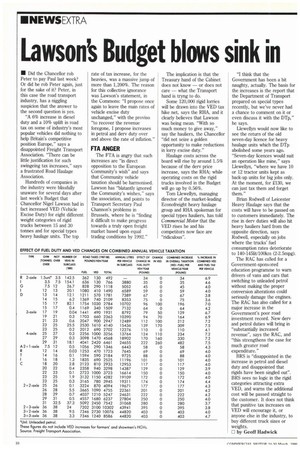Lawson's Budget blows sink in
Page 12

If you've noticed an error in this article please click here to report it so we can fix it.
• Did the Chancellor rob Peter to pay Paul last week? Or did he rob Peter again, just for the sake of it? Peter, in this case the road transport industry, has a niggling suspicion that the answer to the second question is yes.
"A 6% increase in diesel duty and a 10% uplift in road tax on some of industry's most popular vehicles did nothing to help Britain's competitive position Europe," says a disappointed Freight Transport Association. "There can be little justification for such swingeing tax increases," says a frustrated Road Haulage Association.
Hundreds of companies in the industry were blissfully unaware for several days after last week's Budget that Chancellor Nigel Lawson had in fact increased VED (Vehicle Excise Duty) for eight different weight categories of rigid trucks between 15 and 30 tonnes and for special types heavy haulage units. The top rate of tax increase, for the heavies, was a massive jump of more than 1,200%. The reason for this collective ignorance was Lawson's statement, in the Commons: "I propose once again to leave the main rates of vehicle excise duty unchanged," with the proviso "to recover the revenue foregone, I propose increases in petrol and dery duty over and above the rate of inflation."
FTA ANGER
The FTA is angry that such increases are "in direct opposition to the European Community's wish" and says that Community vehicle taxation should be harmonised. Lawson has "blatantly ignored the Community's wishes," says the association, and points to Transport Secretary Paul Charmon's problems in Brussels, where he is "finding it difficult to make progress towards a truly open freight market based upon equal trading conditions by 1992." The implication is that the Treasury hand of the Cabinet does not know or does not care what the Transport hand is tryng to do.
Some 120,000 rigid lorries will be drawn into the VED tax hike net, says the RHA, and it clearly believes that Lawson was being mean. "With so much money to give away," say the hauliers, the Chancellor "did not seize a golden opportunity to make reductions in lorry excise duty."
Haulage costs across the board will rise by around 1.5% because of the dery price increase, says the RHA; while operating costs on the rigid trucks involved in the Budget will go up by 0.56%.
Tom Llewellyn, managing director of the market-leading Econofreight heavy haulage group and RHA spokeman for special types hauliers, has told Commercial Motor that the VED rises he and his competitors now face are "ridiculous". "I think that the Government has been a bit naughty, actually. The basis for the increases is the report that the Department of Transport prepared on special types recently, but we've never had a chance to comment on it or even discuss it with the DTp," he says.
Llewellyn would now like to see the return of the old seven-day licence for heavy haulage units which the DTp abolished some years ago. "Seven-day licences would suit an operation like mine," says Llewellyn, "where we have 10 or 12 tractor units kept as back-up units for big jobs only. At the moment, for 2130, we can just tax them and forget them."
Brian Rodwell of Leicester Heavy Haulage says that the costs will have to be passed on to customers immediately. The rise in dery duties will also hit heavy hauliers hard from the opposite direction, says Rodwell, especially on jobs where the trucks' fuel consumption rates deteriorate to 140-145lit/100km (2-2.5mpg).
The RAC has called for a Government-sponsored education programme to warn drivers of vans and cars that switching to unleaded petrol without making the proper conversion alterations could seriously damage the engines. The RAC has also called for a major increase in the Government's poor road investment record. New dery and petrol duties will bring in "substantially increased revenue", says the RAC, and "this strengthens the case for much greater road expenditure."
BRS is "disappointed in the increase in petrol and diesel duty and disappointed that rigjds have been singled out". BRS sees no logic in the rigid categories attracting extra VED, and warns the additional cost will be passed straight to the customer. It does not think that punitive tax increases on VED will encourage it, or anyone else in the industry, to buy different truck sizes or weights.
O by Geoff Hadwick
















































































































